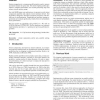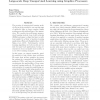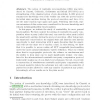53 search results - page 8 / 11 » Forcing a sparse minor |
EGH
2009
Springer
13 years 7 months ago
2009
Springer
Stream compaction is a common parallel primitive used to remove unwanted elements in sparse data. This allows highly parallel algorithms to maintain performance over several proce...
ICML
2009
IEEE
14 years 10 months ago
2009
IEEE
The promise of unsupervised learning methods lies in their potential to use vast amounts of unlabeled data to learn complex, highly nonlinear models with millions of free paramete...
EUROCRYPT
2009
Springer
14 years 10 months ago
2009
Springer
Abstract. The notion of resettable zero-knowledge (rZK) was introduced by Canetti, Goldreich, Goldwasser and Micali (FOCS'01) as a strengthening of the classical notion of zer...
VISUALIZATION
2005
IEEE
14 years 3 months ago
2005
IEEE
In this article we describe stress nets, a technique for exploring 2D tensor fields. Our method allows a user to examine simultaneously the tensors' eigenvectors (both major ...
BMCBI
2010
13 years 10 months ago
2010
Background: Complex human diseases are often caused by multiple mutations, each of which contributes only a minor effect to the disease phenotype. To study the basis for these com...



